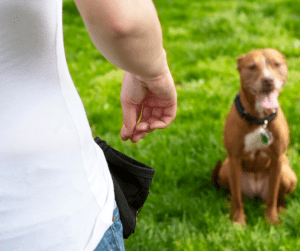Improving Your Dog’s Recall.
Getting your dog to come back reliably can be a challenge for some dog owners. However, with some patience, it is possible to make improvements in most cases. Recall is one of those things that needs reinforcing throughout your dog’s life. Holidays4Dogs offers some advice on how to improve your dog’s recall response.
Recall training is something that many dog owners struggle with. However, teaching your dog to reliably come back to you, is one of the most important skills your dog can learn. It is also crucial your dog is well-behaved and is never considered to be, ‘dangerously out of control in a public space‘ – since this is against the law.
It can be hard to distract some dogs, (and puppies!) from other more exciting things going on around them. Indeed, the aim is to try and be the most exciting thing on the planet to your dog. This, coupled with consistent positive training and motivation, will go a long way to achieving a reliable recall.
Tip : Set your dog up for success.
After being indoors, perhaps several hours, your dog is going to be raring to go on his next walk. However, if he has been bored and unoccupied for a long period beforehand, he is more likely to be distracted away from the house. He, or she, may want to race off in search of fun and games the minute you let him off the lead. If you engage with your dog throughout the day, the more chance there is of him focusing on you, once you leave the house. This will help when attempting to improve your dog’s recall. More about setting your dog up for success here.
Choose high value rewards.


Some dogs will be more motivated than others to come back when they are called. Hounds, for instance, can be challenging when it comes to recall. Therefore, it is really important they are rewarded with something super yummy. Try to vary the type of reward too. This way, there is less chance of the dog getting bored and choosing something better over that same old treat!
Softly, softly, catchee monkey…..
Don’t expect to have a 100% good recall overnight.

If your dog won’t come back to you in the house, or garden, you will have little chance when it comes to an open field. You may have zero chance if there are other dogs, or other distractions going on!
Never punish your dog; no matter how long he takes to come back to you. You should regard this as your fault, not his. If a dog is shouted at when he does eventually return, he may very well take longer next time.
Know when to put your dog on the lead.
Being able to walk with your dog off the lead is great, but it is important to know when to use the lead. In addition, it’s important to be mindful of your dog’s own character and limits. Don’t forget you may not ever feel confident that your dog will come back 100% of the time. However, there is another simple way to keep your dog safe, while being a responsible owner. Always keep your dog on a lead until you are sure it is safe to let he, or she, off.
Long lines are ideal for dogs who lack a solid recall. Long leads provide a better experience of being free.

Even if you think your dog is well trained, accidents can happen. A dog may decided, in a split second, to take off after another dog, (or squirrel!). If that happens to be across a road – the consequences could be dire.
Also, while your dog might be friendly – other dogs may not be so sociable.
You should always be ready, – and able – to get your dog back on the lead, This is especially so, if you see other dog walkers. Other dogs may be reactive, they may be in training, elderly or infirm. Therefore, avoid letting your dog approach other dogs that are on the lead. Also bear in mind not everyone likes dogs and won’t like your dog rushing up to them, whether they have a dog or not. Always be mindful of the feelings of other people.
Conclusion.
Improving your dog’s recall training can take a lot of patience and consistency. However, with the right approach that works for your dog – it makes for a better relationship and a stronger bond between you and your four-legged pal.
holidays4dogs.co.uk is a participant in the Amazon Services LLC Associates Program, an affiliate advertising program designed to provide a means for sites to earn commission fees by advertising and linking to the following websites. Read our full disclosure agreement here.


